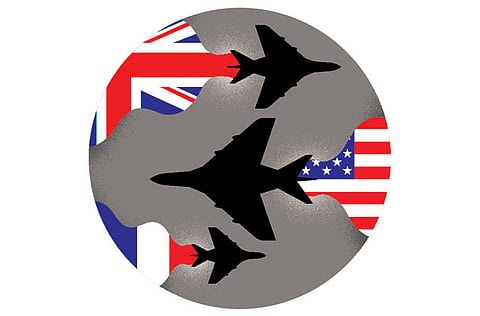Navigating the Libyan quagmire
Western forces need Arab League's backing to neutralise Gaddafi's propaganda

French, British and US fighter jets are patrolling the skies over Benghazi and American and British cruise missiles have been launched from ships and submarines to destroy Colonel Muammar Gaddafi’s air defence system and fuel depots.
Warplanes from other European nations are in Italy preparing to join the fray. Libyan State Television has reported 48 killed in the strikes and up to 150 injured.
Now it appears that the Arab League that blessed UN Security Council Resolution 1973 to protect Libyan civilians from their deranged leader has got cold feet.
Secretary-General Amr Mousa complained on Sunday that “what happened differs from the no-fly zone objectives … What we want is civilian protection not shelling more civilians.”
Resolution 1973 ensures the international legality of actions but the League has now pulled the moral rug from under the coalition, painting the UN effort as another western-led war to effect regime change in yet another Arab state.
Where does this leave the military objectives of the coalition whose hands may now be tied? Those Arab states believed to have materially joined the hastily cobbled-together alliance which have been trying to stay under wraps may now have pause for thought.
It’s no secret that most Arab leaders would love to see the back of Gaddafi who enjoyed offending them with a variety of colourful insults during League meets.
This operation would have been a lot more palatable to Arabs and Libyans still on the fence if a major Arab country, say Egypt which has one of the world’s largest air forces, was seen to be playing an active role.
On Saturday, Libyan State TV reported that “civilian targets are being bombed by the Crusader enemy fighter planes in Tripoli”. Such rhetoric is familiar, coming right out of the mouth of Baghdad’s ‘Comical Ali’ Saddam Hussain’s former minister of information Mohammad Al Sahhaf.
Gaddafi-loyalists are poised to milk as much propaganda as they can from western ‘neo-imperialist’ leadership of the military action. Without the continued backing of the League he will be believed.
Gaddafi is already using the oil card saying the US, Britain and France are conspiring to control Libyan oil while the Libyan oil minister has threatened to give future oil contracts to India, Brazil, Russia, China and Germany, countries that abstained from the Security Council vote.
The world can see through those desperate attempts at manipulating the truth but that doesn’t mean it won’t play well with less informed patriotic Libyans and on the broader Arab street. The problem is that nobody knows how much affection Gaddafi still retains among his people.
Obviously he’s lost whatever support he once had in former Cyrenaica in the eastern part of the country. However, the opinions of the two million residents of Tripoli plus the leanings of the 150,000 in Gaddafi’s hometown Sirte and those of some of the larger tribes (representing 50 per cent of the population) cannot be accurately gauged.
Neither can the loyalties of those closest to the Libyan leader such as the Republican Guard and his sons’ well-equipped militias.
Tripoli-based western media representatives suspect that many of the fanatics waving green flags and shouting ‘God, Gaddafi and Country’ have been paid, but their minders have prevented them from proving those suspicions.
The crazed colonel has threatened Mediterranean ships and civilian airplanes and in a letter to British Prime Minister Cameron, French President Sarkozy and UN Secretary-General Ban-Ki-moon called the resolution invalid and illegal. It appears that Gaddafi, his foreign minister and deputy foreign minister aren’t on the same page.
A further imponderable relates to the ideological bent of the hardcore revolutionary leaders in Benghazi and Derna. Gaddafi’s insistence that he is tackling Al Qaida terrorists in that part of the country is just a red herring.
Nevertheless, Benghazi is an Islamist stronghold with groups calling for Libya to adopt Sharia law and, according to 2008 WikiLeaks cables, Derna has been a breeding ground for fighters in Iraq and Afghanistan.
The duration of the coalition’s military campaign cannot be predicted either. Basically, it could carry on for weeks, months or even years when one recalls how Saddam managed to hang on for a decade in the face of ‘no-fly zones’ and economic sanctions.
Likewise, there is a question mark on the outcome. There is the potential for a ground war or that Libya could be split into two like Sudan or end up with an Islamist anti-western leadership. Both options are unacceptable to the League.
The secret to the allies’ success rests in how they can discern between friend and foe when there is nothing to distinguish pro-Gaddafi and anti-Gaddafi forces and how speedily they can do the job.
The longer the campaign drags on, the more civilian casualties there will be, which could be a game-changer for the Libyan population. And should any coalition planes be shot down, the western public will run out of patience.
Now that Gaddafi is cornered with nowhere to run he has never been as dangerous, especially since he’s threatened to take every Libyan man, woman and child down with him.
Whether he’s allowed safe passage to Venezuela or captured and brought to justice is irrelevant. Libya will be freed. The most pressing issue is when? And how many innocent lives will be lost in the process?
It’s time for Arab states to decide which side they’re on.
Linda S. Heard is a specialist writer on Middle East affairs. She can be contacted at lheard@gulfnews.com. Some of the comments may be considered for publication. For full article, log on to www.gulfnews.com/opinion.


